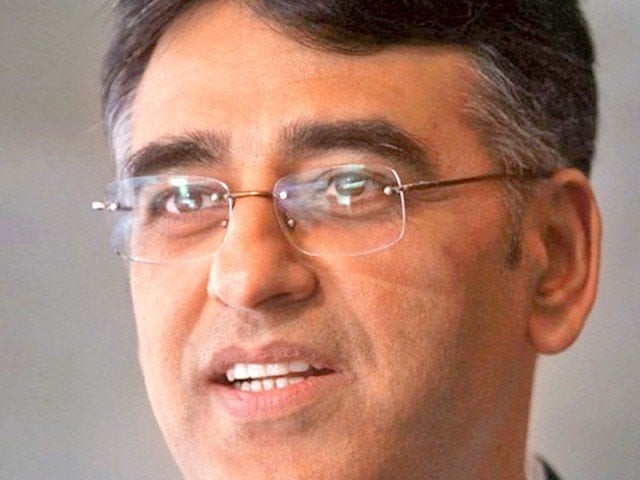Supplementary budgets back in cabinet’s hands
Finance Minister Asad Umar returns his discretionary powers in line with SC’s historic verdict

Finance Minister Asad Umar. PHOTO: EXPRESS/FILE
Finance Minister Asad Umar’s decision to return his discretionary powers to the federal cabinet to grant money during course of the fiscal year would ensure implementation of a historic judgment of Supreme Court in letter and spirit. In its last year in power, the Pakistan Muslim League-Nawaz (PML-N) government had sanctioned Rs860 billion worth supplementary grants.
Punjab Assembly approves supplementary budget
The move to seek prior cabinet approval will also ensure better budget planning, as the government has even barred transfer of money from one approved budget head to another of a ministry without the approval of the cabinet. The bureaucrats of the Planning Ministry blatantly misused this facility to fund politically-pet schemes by diverting funds from other projects.
The Finance Ministry has issued an office memorandum to all the ministries and divisions, directing them to seek approval of the cabinet on all cases of supplementary and technical supplementary grants.
“The administrative secretaries, principal accounting officers are advised to seek approval of the federal cabinet with prior consultation of Finance Division,” read the notification issued on Monday.
The requests received directly without summary of the cabinet will not be entertained by the Finance Division and only those requests for supplementary budgets will be entertained that have endorsements of the federal cabinet, it added.
“The notification has been issued in order to implement the SC’ judgment that defined the federal government as ‘cabinet’,” the Special Secretary Finance Noor Ahmad told The Express Tribune. He said the finance minister did not want to exercise the cabinet’s powers.
In August 2016, the SC ruled that the budgetary expenditure or discretionary governmental expenditure could only be authorised by the federal government – the cabinet and not the prime minister. The PML-N led government had challenged the verdict but the apex court rejected its review petition.
However, in order to circumvent the SC judgment, the federal cabinet in March last year authorised the then finance minister Ishaq Dar to issue supplementary budgets. In February 2017, the cabinet also authorised Dar to appoint heads of government-owned institutions working under the finance ministry.
The federal cabinet has already undone the appointments made by Dar by using these powers. Now, the finance minister has returned his powers to sanction budgets to the cabinet – where it actually belongs.
Getting supplementary budgets is extremely easy right now. The finance ministry informs the National Assembly about the extent of supplementary grants during the time of approval of the next year’s budget, making parliament ineffective.
In the last fiscal year, the previous government spent Rs860 billion over and above the budget approved by parliament for last fiscal year 2017-18. In the preceding year, Rs310 billion worth of supplementary grants had been issued.
Since June 2013, supplementary grants have been issued to pay off circular debt, buy luxury vehicles for the prime minister and his aides, pay subsidies to affluent people like sugar barons and give grants to parliamentarians and bailout packages to the Pakistan International Airlines (PIA).
Even the Pakistan Tehreek-e-Insaf (PTI) government on Tuesday approved Rs63.5 billion subsidy for export-oriented sectors despite there being no money available in the budget of 2018-19. The government now will have to seek the approval of the federal cabinet for provision of subsidy to these sectors.
The last PML-N government had turned down an International Monetary Fund (IMF) proposal to amend the Constitution to make it necessary for the government to seek parliament’s prior approval before obtaining a supplementary budget.
Sindh Assembly approves budget for fiscal year 2018-19
The IMF said Pakistan’s fiscal responsibility framework has a number of important elements, but the current set of fiscal rules has not been able to effectively guide policymaking and deliver debt reduction as planned. The global lender wanted the federal government to surrender its executive powers of sanctioning supplementary budgets without parliament’s approval.
The Iftikhar Chaudhry-led Supreme Court had banned sanctioning of supplementary budgets without parliamentary approval after then prime minister Raja Pervaiz Ashraf got a Rs47 billion supplementary budget for his constituency.
However, after Chaudhry’s retirement, the last federal government got the order reversed on the plea that the Constitution allowed the federal government to issue supplementary budgets.
The unchecked powers to grant supplementary budgets were also one of the reasons behind growing public debt. The IMF’s latest projections showed that Pakistan’s total debt, which is currently at 72.5% of GDP, would keep growing at least for next three years.


















COMMENTS
Comments are moderated and generally will be posted if they are on-topic and not abusive.
For more information, please see our Comments FAQ